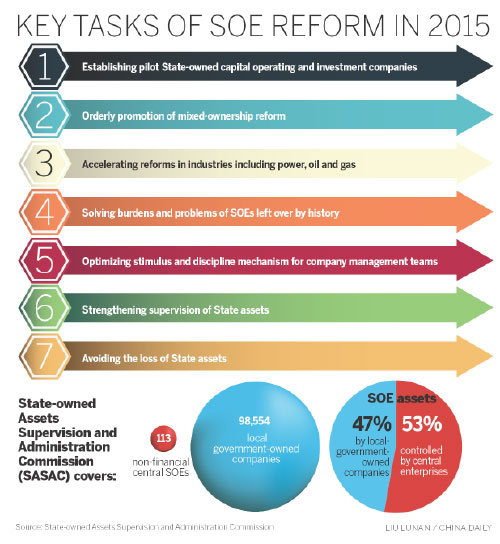
Chinese leaders have vowed to formulate measures for non-State capital to participate in the investment projects of central government enterprises and for non-public enterprises to participate in franchising. However, the pace has been relatively sluggish, according to experts.
China's SOE reform has stagnated during the past decade, while SOEs have been increasingly criticized for their low efficiency.
The productivity gap between State-owned and private companies has widened since the financial crisis in 2008, with an average return on assets for State entities at about 4.6 percent compared with 9.1 percent for private companies, according to estimates last year by Gavekal Dragonomics, an economic research company in Beijing.
Andrew Batson, the company's China research director, said mixed ownership did not imply an embrace of mass privatization, but added: "As the economy slows further and financial pressure on local governments increases, privatization should become more acceptable."
Local governments have moved more quickly than central authorities in implementing SOE reform, as they needed to find new sources for revenue and lower their liabilities. More than 20 provinces and municipalities have announced local reform plans, including promoting mixed ownership and restructuring State capital.
However, some private business leaders have raised concerns that they would have no influence as board members of mixed-ownership firms.
In addition, a policy memorandum from the Paulson Institute, a think tank on China-United States relations, warned that improvements in performance would not automatically follow private investment in China's State-controlled companies.
"The prospects for a mixed-ownership economy will ultimately depend on the State's willingness to cede control-not just ownership-of some of the nation's largest enterprises to private interests," the memorandum said.
Analysis posted on the website of Britain's Foreign and Commonwealth Office said local branches of the State-owned Assets Supervision and Administration Commission "have been keen to emphasize to us that they encourage foreign as well as domestic investment" in SOEs.
"For now, genuinely interesting commercial opportunities may be limited," the analysis went on.
"However, reform, if thoroughly implemented, should lead to the opening-up of State-owned monopolies, creating interesting new investment opportunities and a fairer environment for all companies, domestic and foreign, to compete."
